Oronsaye Report Implementation: Scrapped and Proposed Agencies
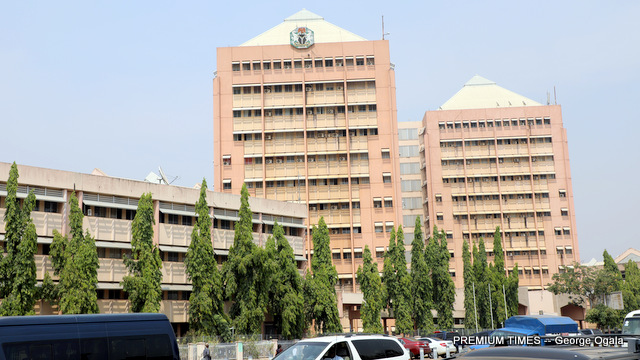
Federal Secretariat
By Agency
President Bola Tinubu has ordered the implementation of the Stephen Oronsaye panel’s report on the reform of the civil service. The recommendations of the committee will see to the abolition, reduction, merger, and revision of some MDAs.
The Former president Goodluck Jonathan in 2011 established the Presidential Committee on Restructuring and Rationalisation of Federal Government Parastatals, Commissions and Agencies under the chairmanship of Oronsaye.
Oronsaye is a retired Head of the Civil Service of the Federation.
His brief was to look at ways of cutting the cost of governing by eliminating wastage through duplicated functions across several government MDAs.
Members of the committee included: Japh CT Nwosu; Rabiu D. Abubakar; Salman Mann; Hamza A. Tahir; Adetunji Adesunkanmi; and Umar Mohammed (Member/Secretary).
The committee submitted an 800-page report on April 16, 2012, in which it uncovered a high level of competition among several overlapping agencies, which not only created ill feelings among government agencies but also brought about unnecessary wastage in expenditure.
It also recommended, among other things, the discontinuation of government funding of professional bodies and councils to free funds for capital projects.
The Oronsaye report established that there are 541 Federal Government parastatals, commissions and agencies (statutory and non-statutory) and recommended that 263 of the statutory agencies should be reduced to 161, while 38 agencies should be abolished and 52 should be merged
The panel also recommended that 14 of the agencies should revert to departments in ministries.
The government later set up a White Paper Drafting Committee headed by the then Attorney-General of the Federation and Minister of Justice, Mohammed Adoke, SAN, to study the recommendations and to produce a White Paper on the report.
The White paper Drafting Committee had many other top government functionaries such as: Ms. Ama Pepple, Minister of Land, Housing/Urban Development; Alhaji Isa Bello Sali, Head of the Civil Service of the Federation; Chief Emeka Wogu, then Minister of Labour and Productivity; Mrs Omobola Johnson, Minister of Communication Technology; and Dr. Shamsuddeen Usman, Minister/Deputy Chairman, National Planning Commission.
Others were: Dr A. J. Awosika, Permanent Secretary, Ministry of Power; Engr. Emeka Eze, Director-General, Bureau of Public Procurement; Dr. Ochi C. Achinuvu, Senior Special Assistant, Economic Matters, Office of the COS to the President; and Mr. Femi Olayisade, Permanent Secretary, General Services Office (OSGF) who served as member/secretary.
While summarising his 800-page report, the committee noted that: “It is a fundamental breach of the acceptable practice of good public sector governance to create a new agency or institution as a response to the seeming failure or poor performance of an existing agency to suit political or individual interests. Such a practice, it said, has proved eventually to precipitate systemic conflicts, crises and even collapse at a substantial but avoidably high financial cost to the government.”
The presidential committee noted further that: “The long-standing challenges that beset the Nigerian public sector, including the parastatals, have created a ‘single story’ of inefficiency, corruption, poor work environment, low morale, ineffectiveness, deceit and low productivity, thereby establishing a perception of a dysfunctional and unproductive public sector…where it is unable to perform its legitimate functions creditably.”
– Shettima
The committee proffered four ways to immediately tackle the high cost of governance. These include: “Reduction in the number and size of the governing boards of parastatals; linking the budgetary system to deliverables and output; Implementation or vacation of some decisions taken on past reports; and Removal of all professional bodies/councils from the national budget.”
The committee established that as of then, there were 541 government parastatals, commissions and agencies (statutory and non-statutory). 263 of these were statutory agencies which it recommended reduced to 161. To achieve this, the committee proposed the abolition of 38 agencies, the merger of 52 and the reversion of 14 to departments in ministries.
The rationale was that there were “duplications and overlaps in the mandates of many parastatals and agencies…without regard to existing laws and, in some cases, out-rightly replicating extant laws.”
The recommendations of the Oronsaye Report bordered on historic weaknesses in the country’s public service. President Muhammadu Buhari’s response to the report, however, came in November 2021, when it instituted two committees under two former Heads of Service of the Federation. The first was to review the Oronsaye Report while the other was to interrogate all new establishments set up after 2014.
Highlights of the Oronsaye Report:
Oronsaye Committee had far-reaching recommendations on MDAs that should be abolished, scrapped, those to be merged and those to become self-funding, thereby freeing funds for the much-needed capital projects across the country.
– 929 MDAs currently in the Federal Government budgeting structure
– The report identified 541 Parastatals, Commissions, and FG Agencies.
– Recommends 38 Federal Agencies to be abolished – Public Complaints Commission, National Poverty Eradication Programme, Utilities Charges Commission, National Agency for the Control of HIV/AIDS, National Intelligence Committee, etc.
– 14 agencies to be fused into ministries where they were created e.g Debt Management Office to the Federal Ministry of Finance
– Public Health Department back to the Federal Ministry of Health
– National Information Technology Development Agency to be fused into the Ministry of Communication Technology
– Reduction of statutory agencies from 263 to 161
– 52 institutions to be merged: NTA, FRCN & VON into the Federal Broadcasting Corporation of Nigeria (FBCN)
– NCC & NBC into Communication Regulatory Authority of Nigeria (CRAN);
– CCB, EFCC & ICPC to be merged into the Anti-Corruption Commission.
– Another key recommendation of the committee was to discontinue government funding of professional bodies and councils. Consequently, there is a need to amend the Professional Bodies (Special Provisions) Act, of 1972 which mandates the government to provide financial support of various kinds to such bodies. – They include the Teachers Registration Council of Nigeria (TRCN); Computer Professionals Council of Nigeria (CPRCN); Advertising Practitioners Council of Nigeria (APCON); Nigeria Press Council; Architects Registration Council; Council for Registered Engineers of Nigeria (COREN); Estate Surveyors’ Registration Board (ESRB); Town Planners Council (TPC); Nigerian Builders Council (NBC; Quantity Surveyors’ Registration Board of Nigeria (QSRB); Nigerian Builders Council (NBC); and Council of Nigerian Mining Engineers and Geoscientists (COMEG).
Institute for Peace and Conflict Resolution to be scrapped and its functions to be transferred to the Department of Strategic Studies in the Nigerian Institute for International Affairs (NIIA).
The committee recommended that the Petroleum Products Pricing Regulatory Authority (PPPRA) and Petroleum Equalisation Fund be merged with Petroleum Equalisation Fund (PEF). The government was undecided on this recommendation.
– Based on the White Paper, the Fiscal Responsibility Commission (FRC) would be abolished and its enabling law repealed as its functions are being performed by the Revenue Mobilisation Allocation and Fiscal Commission. A similar fate awaits the Salaries and Wages Income Commission.
– The trio of the Nigerian Airspace Management Agency (NAMA), Nigerian Civil Aviation Authority (NCAA) and the Nigerian Metrological Agency (NIMET) were recommended to be merged into a new body to be known as the Federal Civil Aviation Authority (FCAA) and their respective enabling laws amended accordingly to reflect the merger.
– Nigerian Investment Promotion Council (NIPC), the Committee recommended that it be merged with the Nigerian Export Promotion Council (NEPC) to synergize for management and utilization of resources.
– The Committee recommended that the enabling law of the National Commission for Nomadic Education be repealed and the Commission’s activities taken over by the Universal Basic Education Commission.
– National Oil Spill Detection and Response Agency (NOSDRA) and National Environmental Standards and Regulations Enforcement Agency (NESREA) and their function performed in the Ministry of Environment.
– The recommendation that the National Council of Arts and Culture (NCAC) be merged with the National Troupe and the National Theatre into one agency was accepted by the government. The merged entity is to be named the National Theatre of Nigeria.
– The committee recommended that the National Hajj Commission of Nigeria (NAHCON) and Nigerian Christian Pilgrims Commission (NCPC) be scraped and government restrict itself to only providing consular service and vaccination of intending pilgrims.
– The Nigerian Communications Commission, the Nigerian Broadcasting Commission and the regulatory functions of the Nigerian Postal Services were recommended by the committee to be merged.



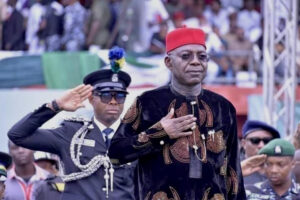
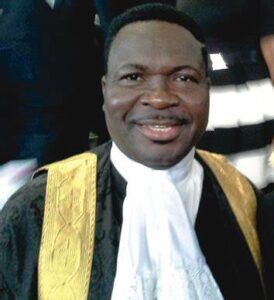
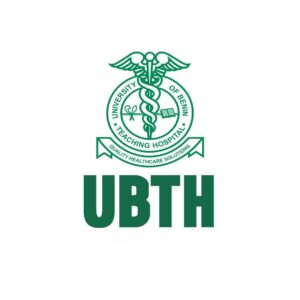
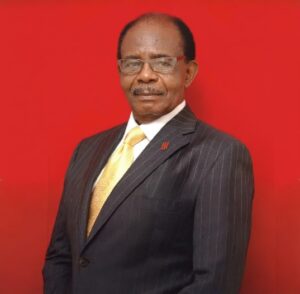
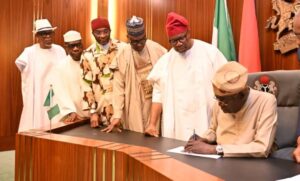
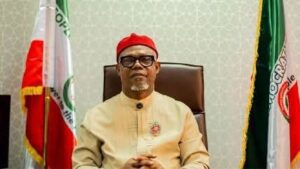
b7967c